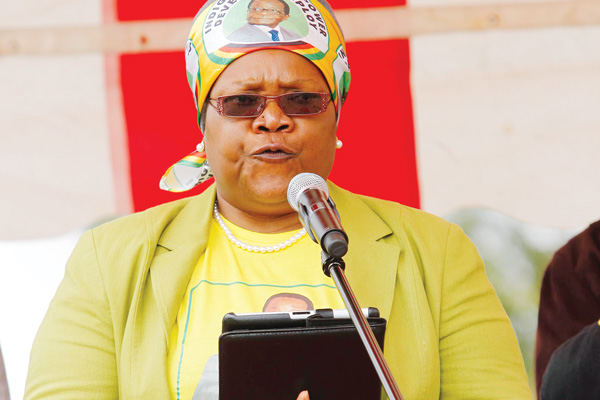
Former Finance minister Tendai Biti has been the most vocal supporter of a coalition of opposition parties to tackle ageing President Robert Mugabe in the 2018 elections and rescue Zimbabwe from being led by a 94-year-old.
BY XOLISANI NCUBE
Biti, an ex-MDC-T secretary-general, even appeared ready to bury the hatchet and join hands with Tsvangirai to end the reign of one of the world’s oldest and longest-serving leaders.
At one time he had formed what appeared to be a loose alliance with former vice-president Joice Mujuru.
However, Mujuru and Tsvangirai have shown little enthusiasm about forming a coalition with other parties, probably in the comfort that they have the biggest numbers behind them.
The former prime minister seemed to confirm those fears last week when he lashed out at former party members who were now proposing coalition talks after forming their own outfits.
Biti lost it, hitting Tsvangirai below the belt when he tweeted: “Only a fool believes he or she holds a patent over this struggle. There is no Zimbabwean bigger or better than the other.”
The MDC-T leader infamously called on other opposition parties to join his “big tent”, insinuating that he has more supporters and at one point called himself the main character in the battle to topple Mugabe’s regime.
- Chamisa under fire over US$120K donation
- Mavhunga puts DeMbare into Chibuku quarterfinals
- Pension funds bet on Cabora Bassa oilfields
- Councils defy govt fire tender directive
Keep Reading
Besides Tsvangirai’s ego, analysts believe the rivalry between the former Zimbabwe Congress of Trade Unions leader and Mujuru is stalling efforts by opposition parties to form a coalition.
While most credible opposition parties agree that the best way to dislodge Mugabe is through a coalition, some of them have been dragging their feet and ducking the issue by making unreasonable demands.
Political analyst Ibbo Mandaza said as long as the opposition leaders were pre-occupied with the question of who would lead the envisaged grand coalition, chances that it would come to fruition were slim.
“There is a tussle over who should lead the coalition, [MDC-T leader] Morgan Tsvangirai believes he deserves to be the leader.
“His deputies believe that in an event that he does not want to, it should be someone from their side,” Mandaza said.
“[Zimbabwe People First leader] Mujuru too believes she can and deserves it.
“So in the process, before we talk about other mechanisms and below structures the people are fighting over the top leadership.”
He added: “In my view, the talks should be centred on the processes and policies as opposed to individuals and positions.
“Yes, positions are important, but we must first find common ground on issues, reforms and agree on what would make Zimbabwe great again through reforms, then we can talk about positions. There has to be concessions and sacrifices on both ends.”
So far smaller opposition political parties have formed a loose alliance dubbed the Coalition of Democrats (Code) which is an agreement to guide them towards forming a coalition ahead of the 2018 polls.
Code comprises the likes of Simba Makoni’s Mavambo/Kusile/Dawn (MKD), Welshman Ncube’s Movement for Democratic Change, Elton Mangoma’s Renewal Democrats of Zimbabwe as well as the little-known Democratic Assembly for Restoration and Empowerment led by Gilbert Dzikiti.
Last week the parties intensified their talks in neighbouring South Africa but Mujuru and Tsvangirai stayed away.
It remains unclear who will lead a grand coalition or how it would operate, but political parties said they would be guided by principles of working and cooperating with others in an equal, open and respectful manner, respect and observance of collective decision-making, equality, diversity, tolerance, and respect for all and each other, non-violence, tolerance and the peaceful resolution of issues and conflicts, among many other principles.
MDC-T and ZimPF did not sign the Code document and there are reports that the two parties would form their own coalition.
Analysts believe an opposition alliance without Mujuru and Tsvangirai would be ineffective.
Tsvangirai, having lost thrice to Mugabe since he formed his opposition party, has an advantage of a known support base which since 2000 has been hovering above one million voters, while Mujuru, with her liberation war experience, brings on board the support of war veterans and access to state machinery — a feat that the former trade unionist has failed to achieve for long.
Mujuru also brings public service experience and an understanding of Zanu PF political dynamics due to her stint with the party and in government for 34 years, a decade of which she served as Mugabe’s deputy.
Outside the Code forum, other parties have been working together under National Electoral Reform Agenda (Nera), but there is little progress in forming a strong and united force to challenge Mugabe.
Under Nera, both Tsvangirai and Mujuru are vocal, although the coalition’s main thrust is to push for electoral reforms ahead of the 2018 polls.
Another political analyst, Alexander Rusero said the coalition talks could also be hindered by “inflated egos” among the political players.
“There are two issues that would cause the coalition to fail; firstly, you have a collection of personalities with big egos.
“No one seems to be willing to compromise on who would lead the coalition and this would make the whole process fail,” Rusero said.
“Also, you have in these political parties intra-conflicts that are working against the coalition.
“Until such a time when they resolve these intra-fights, they will never agree.
“So long as the coalition is not being pushed by the masses who are the voters but the leaders themselves, it would fail.”
He added: “The coalition should not be about removing Mugabe and Zanu PF but bringing on board a wholesome of changes that would inspire political participation of the people.”
MDC-T spokesperson Obert Gutu, said his party was committed to a coalition and it had mandated Tsvangirai to negotiate with all political players who share the same vision with the mainstream opposition.










